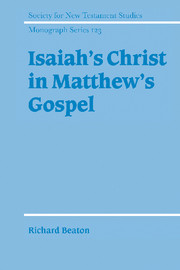Book contents
- Frontmatter
- Contents
- Preface
- List of abbreviations
- 1 Introduction
- 2 History of research
- 3 Texts and early Jewish exegesis
- 4 Isaianic formula quotations in Matthew
- 5 Isaiah 42.1–4 within the context of Matthew 11–13
- 6 The christological contribution of Isaiah 42.1–4
- 7 Conclusion
- Bibliography
- Index of passages
- Index of modern authors
- Index of subjects
2 - History of research
Published online by Cambridge University Press: 22 September 2009
- Frontmatter
- Contents
- Preface
- List of abbreviations
- 1 Introduction
- 2 History of research
- 3 Texts and early Jewish exegesis
- 4 Isaianic formula quotations in Matthew
- 5 Isaiah 42.1–4 within the context of Matthew 11–13
- 6 The christological contribution of Isaiah 42.1–4
- 7 Conclusion
- Bibliography
- Index of passages
- Index of modern authors
- Index of subjects
Summary
The composition, interpretation and redeployment of texts, otherwise known as intertextuality, is, as M. Fishbane has persuasively demonstrated, an ancient practice. A perusal of the sacred and non-sacred early Jewish texts will introduce the modern reader to this prolonged discourse that has been conducted over a period spanning many centuries as each generation of authors interpreted and applied authoritative texts in an attempt to address contemporaneous situations. In addition to the explicit discussions about the meaning of the texts evidenced in the commentary found in Qumran pesher and in the rabbis, there is the residue, or deposit, that is extant in the text and translations themselves, such as the MT, LXX and Targums. As M. Black reminds us, ‘problems of translation, interpretation and text are inextricably inter-connected: there is no translation that is not an interpretation and questions of text are basic to all hermeneutic’. Early Christianity developed and grew in an environment that strongly emphasized the importance of text, and one is not surprised to discover considerable continuity between Jewish and early Christian usage of the Scriptures.
Research has confirmed that a high level of continuity existed between Jewish and early Christian exegesis. Because the Scriptures were deemed authoritative, they formed the basis for thought and practice, for answers to the problems of change, for the defence of the faith and, ultimately, for the construction of worldviews. Vermes observes,
Religious teachers … confronted with new situations unforeseen by the legislators, found themselves faced with the task of associating them with that message and of giving them scriptural relevance. In addition, Palestinian Jewry was divided, from the second century B.C. to the end of the Second Temple, into separate and rival groups (Pharisees, Sadducees, Essenes, Judeo-Christians), each of which slanted its interpretative system to justify the biblical authenticity of its beliefs and way of life. Here then were two other demands: exegesis was required to adapt and complete scripture so that it might on the one hand apply to the present time, and on the other, satisfy the requirements of polemics.
- Type
- Chapter
- Information
- Isaiah's Christ in Matthew's Gospel , pp. 14 - 43Publisher: Cambridge University PressPrint publication year: 2002



